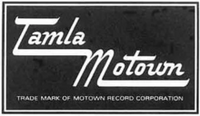Motown: Difference between revisions
(Created page with "Category:Influences on Morrissey - Music ==Relevance== {{Page |WikipediaPageTitle=Motown }}") |
No edit summary |
||
| (One intermediate revision by the same user not shown) | |||
| Line 1: | Line 1: | ||
[[Category:Influences on Morrissey - Music]] | [[Category:Influences on Morrissey - Music]] | ||
[[File:Tamla Motown logo variant A.webp.png | 200px | right | thumb |Tamla Motown logo]] | |||
==Relevance== | ==Relevance== | ||
{{Page | {{Page | ||
|DiscogsLabelId=33859 | |||
|WikipediaPageTitle=Motown | |WikipediaPageTitle=Motown | ||
}} | }} | ||
{{PageDate}} | |||
Latest revision as of 20:31, 28 February 2023
Relevance
Mentioned In
Discogs Information
Profile
Multinational label; for all unofficial / bootleg releases of this label please use Tamla Motown (2). Label Code: LC 0363 / LC 00363
Tamla Motown was a label created by UK Tamla-Motown Appreciation Society head Dave Godin after a trip to Detroit at the end of 1964 where Berry Gordy agreed that the UK would have a label presence under that name, distributed by E.M.I. Records Limited. The first releases were in March 1965 in the UK.
Thereafter the label was used by EMI companies worldwide until replaced by the Motown blue label in October 1976, although it was still used for reissues. RCA took over distribution of the label in the United Kingdom in 1981 and it is now owned by Universal Music Group.
The label's name and variations on the UK EMI designed logo were also used by non-EMI companies, as Motown owned the brand, most notably in Canada. Any Tamla Motown branded release is 1965 or later.
External Links
Wikipedia Information
 |
Motown is an American record label owned by the Universal Music Group. It was founded by Berry Gordy Jr. as Tamla Records on January 12, 1959, and incorporated as Motown Record Corporation on April 14, 1960. Its name, a portmanteau of motor and town, has become a nickname for Detroit, where the label was originally headquartered. Motown played a vital role in the racial integration of popular music as an African American-owned label that achieved crossover success with white audiences. In the 1960s, Motown and its subsidiary labels (including Tamla-Motown, the brand used outside the US) were the most prominent exponents of what became known as the Motown sound, a style of soul music with a mainstream pop appeal. Motown was the most successful soul music label, with a net worth of $61 million. During the 1960s, Motown achieved 79 records in the top-ten of the Billboard Hot 100 between 1960 and 1969. Following the events of the Detroit Riots of 1967, and the loss of key songwriting/production team Holland–Dozier–Holland that year over pay disputes, Gordy moved Motown to Los Angeles, California. Motown expanded into film and television production. It was an independent company until MCA Records bought it in 1988. PolyGram purchased the label from MCA in 1993, followed by MCA successor Universal Music Group, which acquired PolyGram in 1999. Motown spent much of the 2000s headquartered in New York City as a part of the UMG subsidiaries Universal Motown and Universal Motown Republic Group. From 2011 to 2014, it was a part of The Island Def Jam Music Group division of Universal Music. In 2014, however, UMG announced the dissolution of Island Def Jam, and Motown relocated back to Los Angeles to operate under the Capitol Music Group, now operating out of the Capitol Tower. In 2018, Motown was inducted into Rhythm and Blues Music Hall of Fame in a ceremony held at the Charles H. Wright Museum. In 2021, Motown separated from the Capitol Music Group to become a standalone label once again. On November 29, 2022, Ethiopia Habtemariam announced that she would be stepping down as chairwoman/CEO of Motown. As of 2023, the label has many acts signed such as City Girls, Diddy, Migos, Lil Baby, Lil Yachty, Smino, Vince Staples, YoungBoy Never Broke Again, and several other artists in the hip-hop and R&B genres.
